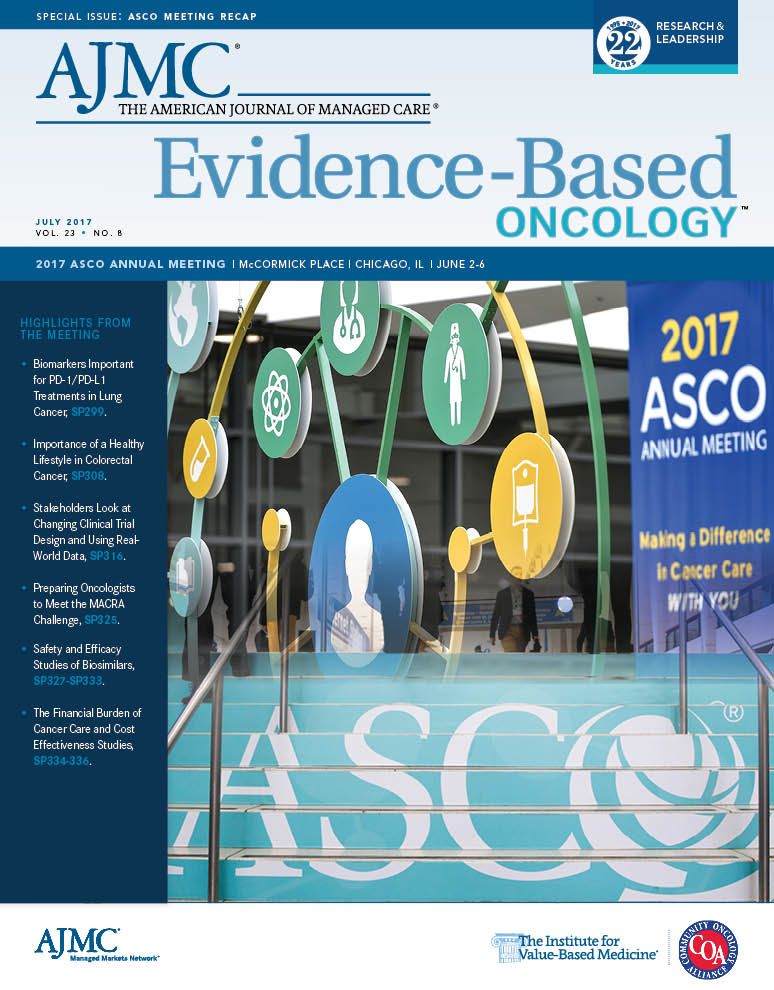- Center on Health Equity & Access
- Clinical
- Health Care Cost
- Health Care Delivery
- Insurance
- Policy
- Technology
- Value-Based Care
Adjuvant Chemotherapy Reduces Cost, Improves Survival in NSCLC Post-Surgery
Including adjuvant chemotherapy in the postsurgical treatment plan in patients with non—small cell lung cancer (NSCLC) improves survival and is cost-effective compared with surgical resection alone, according to analysis results presented at the 2017 American Society of Clinical Oncology Annual Meeting.
A COST-EFFECTIVENESS ANALYSIS
conducted by researchers at Rush University, Washington University, and St. Louis University has found that including adjuvant chemotherapy in the postsurgical treatment plan in patients with non—small cell lung cancer (NSCLC) improves survival and is cost-effective compared with surgical resection alone. The results were presented at the 2017 American Society of Clinical Oncology Annual Meeting.
The benefits of adjuvant chemotherapy in stage I NSCLC remain controversial, as patients die from systemic relapse. Therefore, the authors of the current study evaluated the effectiveness and cost-effectiveness of adjuvant chemotherapy after surgical resection in stage IB NSCLC.
The authors conducted propensity score matching on the National Cancer Database for the period between 2004 and 2011. The Kaplan-Meier method generated conditional probabilistic incremental 1- to 5-year survival after surgical resection stratified by receipt of adjuvant chemotherapy. Medicare- allowable charges for surgical resection and adjuvant chemotherapy, and their respective complications, were used, and proportions of chemotherapeutic agents administered in real-world settings were estimated by decision modeling. The incremental cost-effectiveness ratio (ICER) was calculated over a 5-year period.
The analysis found that 3662 of 18,709 patients who met the inclusion criteria received adjuvant chemotherapy and surgical resection for stage IB NSCLC; the annual usage ranged from 15% to 27%. Propensity score matching showed an overall survival benefit of including adjuvant chemotherapy in the treatment plan over surgical resection alone (at 5 years: 68.9% vs 60.4%; P <.001).
The incremental cost of adjuvant chemotherapy over surgical resection alone was $11,541, and the incremental effectiveness of adjuvant chemotherapy was 0.28 life-years, with an ICER of $41,218. Using 2-way sensitivity analysis, the authors found that the combination treatment dominated for the entire range of cost and survival estimates, while with a probabilistic sensitivity analysis, the combination dominated the model above a willing-to-pay threshold of $16,000. While adjuvant chemotherapy costs could nearly double, the ICER remained under conventional thresholds. However, only 3 of the 4 common adjuvant chemotherapy regimens were cost-effective.
Based on their findings, the authors conclude that in stage IB NSCLC, surgery is insufficient to render a cure, but that including adjuvant chemotherapy in the treatment plan extends life expectancy and is cost-effective compared with surgery alone. These conclusions are valid over a range of clinically meaningful variations in cost and treatment outcomes, although a cost-conscious approach is needed when selecting an adjuvant chemotherapy regimen.REFERENCE
Hudson JL, Aung WY, Santos C, et al. The role of adjuvant chemotherapy in stage IB non-small cell lung cancer: a decision, effectiveness, and cost-effectiveness analysis. J Clin Oncol. 2017;35(suppl; abstract 8526).

Telehealth Intervention by Pharmacists Collaboratively Enhances Hypertension Management and Outcomes
January 7th 2026Patient interaction and enhanced support with clinical pharmacists significantly improved pass rates for a measure of controlling blood pressure compared with usual care.
Read More
Exploring Racial, Ethnic Disparities in Cancer Care Prior Authorization Decisions
October 24th 2024On this episode of Managed Care Cast, we're talking with the author of a study published in the October 2024 issue of The American Journal of Managed Care® that explored prior authorization decisions in cancer care by race and ethnicity for commercially insured patients.
Listen

